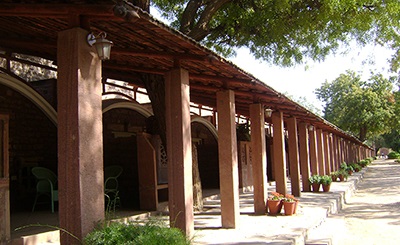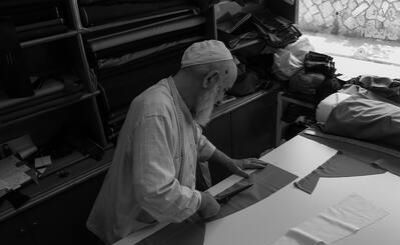
Nalini had not returned home from school at the usual hour. She had not been at the school gate waiting for Mrinalini. Not in her classroom, not locked anywhere in any other part of her school. She did not make friends easily; sometimes, not at all. Nobody who had seen her that day could trace her movements after school hours.
She had not been found in the ill-frequented park where her mother had often had had to stop Nalini from going; the swings there had appealed to Nalini, called out to her, she had told her mother once. (They had both broken into a cacophony of laughter after that confession, so full of a mischievous endearment from Nalini’s end.) Nalini embraced the breeze as the swing threw her up into the ether of the sky, the earth below lying abandoned beyond her closed eyes:
Mrinalini could see in her mind. Eavesdropping wasn’t allowed; it was not needed. The breeze, in the meanwhile, would enliven into the shape of her embrace.
Back home, before sitting down with school-work, the eleven-year old would beam when accompanying her mother over tea, not leaving Mrinalini’s side when she would put the leaves into the water to be swept away in the accumulating black, carbon ink usurping the bland of the water in time. She would insist that she be allowed to pour the milk into it, and the sugar — its granules immersing into the steel pan of tea, water and milk, would make Nalini’s cheeks rise on either side of her face to the alarming yet innocent elbowing that the sides of her mouth got. Her mouth — a sleeping orange rose waking to specks of rain; rain’s afterwards. Mrinalini never quite understood the cause of her daughter’s undeterred joy in this exercise. But every time she watched her daughter sipping tea, she saw her face ignite from pleasure like through a marble, light, amid floating motes of a dying day. Sixteen days had passed, and Nalini had not returned. Nothing of her, even that.
On the seventeenth, when the clock stopped at the sun’s gnawing screams somewhere from amid the thumping lava of the setting sky ...
While the water for the late evening tea would start to form bubbles, a quick walk three floors down could be finished in no time. The trash bag was about to overflow. The empty red box of the orange pekoe tea would not fit in the already bulging, misshapen-with-huge-lumps, white bag.
Getting down the first flight of stairs, Mrinalini saw the two binder clips a third or a fourth or fifth time during that day. Two binder clips with shiny, golden heads, clipped onto each other, lying mute at the centre of one of the steps. On the fourth step from the top. Others, like Mrinalini, must have avoided stepping on the clips. They hadn’t moved, Mrinalini noted, still on the fourth step. No one had picked up, or thrown them away. Curious, Mrinalini thought. Curious that even she had passed the clips a third, fourth or a fifth time today but had not picked them up. Like the others.
The smell of fresh flowers from a washing liquid raining into clothes from one of the apartments on the ground floor replaced the fluid space of Mrinalini’s attention for a few seconds, diluting it. But there was no afterthought. It was in the air, the smell. Not of orange roses. The image of crisp, fresh, warm clothes awaiting in a tumble of disarray to be folded back into shape, into categories inside a dresser (although not necessarily) appeared in her mind for a second or less and then, a cup of warm tea: Mrinalini looked forward to it. The water must have begun to ooze light smoke, gathering into a still lull, before the bubbles would begin to form. The smoke would thicken.
Now through the stairs on to the passage leading out of the apartment building, Mrinalini walked towards the dumpsters, picking up pace. She had left the flower-like smell behind only to be greeted by the odour of abandoned left-overs of the bins. Adding her garbage bag to the orphanage of dispensables, Mrinalini, with her eyes cast down, started to walk back. The reflection of the swaying leaves of the trees above fell on the path that she had begun walking on. The leaves — their colour, transformed from green to deep black on the grey of the street under the lingering street lights.
The water must have started to recede in the pan by now, a little at a time, and an overpowering vapor would soon make it untraceable, but the leaves’ shadows absorb Mrinalini’s shadow. So she moves to her right, out of their grasp.
Theirs is not my garb, she says. I cannot have a side of me frayed by the protruding jaws of the leaves, opening and closing, trembling, ambiguous in the trembling, as the breeze gushes to reach a crescendo, like the blurring of the pianist’s moving fingers on a piece of music full of crochets set to an incredibly rapid tempo.
Separated from the shadow of the leaves, Mrinalini’s is the same deep black on the grey of the street under the lingering street lights.
My shadow — it moves, as I move, stands as I stand, with me. I can never leave it, it will not leave me and shadows outside of myself will not cower, cover, conceal it. See, it keeps with me.
Mrinalini paused.
“Walk with me to the music of the leaves, Nalini,
“‘Pretense’ is the name of the piece I play.
Then, shall we have tea?”
The water in the pan no longer, no more than parched white dots, soon to become the colour of burning. Whimpers from the pan, its skin sticking on to the red, wild, fiery sparks of the outraged coil on the stove begin to be heard.
The binder clips lie on the fourth step, still. Still. The clothes would have been washed by now.
You and I, home.
“… shall we have tea?”
More from The Byword
Comments
*Comments will be moderated








THUMBS.jpg)


